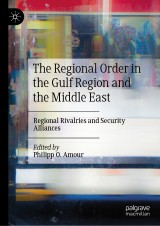Details

The Regional Order in the Gulf Region and the Middle East
Regional Rivalries and Security Alliances|
CHF 177.00 |
|
| Verlag: | Palgrave Macmillan |
| Format: | |
| Veröffentl.: | 04.07.2020 |
| ISBN/EAN: | 9783030454654 |
| Sprache: | englisch |
Dieses eBook enthält ein Wasserzeichen.
Beschreibungen
<p></p><p>This book examines the regional order in the Gulf Region and the wider Middle East, focusing on regional rivalries and security alliances. The authors analyze the regional system in terms of its general structure as well as the major inter-state and non-state security alliances. The structure of the regional system in the wider Middle East and the shake-ups it has experienced explain the ongoing regional rivalry and polarization since 2011 in hotspots such as Syria, Yemen, and Libya. As such, the various chapters address regional transition and power dynamics between and among regional great powers and non-state militant actors across the Gulf Region and the wider Middle East in terms of the alliance building, persistence, and disintegration since 2011.</p><br><p></p>
<p>Chapter 1. Introduction: The regional order in the Gulf Region and the Middle.- Part 1. Security alliances in the Gulf region and the Middle East.- Chapter 2. Political Islam as an ordering factor? The reconfiguration of the regional order in the Middle East since the “Arab Spring”.- Chapter 3. Gulfization of the Middle East Security Complex: the Arab Spring’s Systemic Change.- Chapter 4. The conservative-resistance camp: The Axis of Resistance.- Chapter 5. The Emergence of the Turkish-Qatari Alliance in the Middle East: Making of the Moderate Resistance Bloc.- Part 2. State actors and non–state militant actors.- Chapter 6. Expanding the Turkish bid for Regional Control in the Somali Regional Security Complexes.- Chapter 7. Qatar’s Calculated Gamble on the Syrian Muslim Brotherhood.- Chapter 8. (Un)Limited Force: Regional Realignments, Israeli Operations and the Security of Gaza.- Chapter 9. The evolution of Iraq’s Hashd al-Sha’abi (Popular Mobilization Forces).- Chapter 10. Between the PYD and DAESH: the rise of non-state actors in Syria.- Part 3. External actors.- Chapter 11. Domestic and External Factors in the 2011 Syrian Conflict: Towards a Multi-Causal Explanation.- Chapter 12. Lending an ‘Old Friend’ a Hand: Why Does Russia Back Syria?.- Chapter 13. Contribution of Water Scarcity and Sustainability Failures to Disintegration and Conflict in the Arab Region – The case of Syria and Yemen.- Chapter 14. The regional system in the Gulf Region and the Middle East in retrospect and prospect.</p><p></p><p></p><p><br></p><p></p><p></p><p></p><p></p><p></p><p></p><p></p><div><br></div><div><br></div>
<p></p><p><b>Philipp O. Amour</b> is an Associate Professor of International Relations at Sakarya University and a frequent Visiting Professor at Boğaziçi University, Turkey. He has published scholarly articles in the <i>International Journal of Middle East Studies</i> and <i>British Journal of Middle Eastern Studies</i> as well as book chapters with leading publishers.</p><br><p></p>
<p>This book examines the regional order in the Gulf Region and the wider Middle East, focusing on regional rivalries and security alliances. The authors analyze the regional system in terms of its general structure as well as the major inter-state and non-state security alliances. The structure of the regional system in the wider Middle East and the shake-ups it has experienced explain the ongoing regional rivalry and polarization since 2011 in hotspots such as Syria, Yemen, and Libya. As such, the various chapters address regional transition and power dynamics between and among regional great powers and non-state militant actors across the Gulf Region and the wider Middle East in terms of the alliance building, persistence, and disintegration since 2011.</p><p><br></p><b>Philipp O. Amour</b> is an Associate Professor of International Relations at Sakarya University and a frequent Visiting Professor at Boğaziçi University, Turkey. He has published scholarly articles in the <i>International Journal of Middle East Studies</i> and <i>British Journal of Middle Eastern Studies</i> as well as book chapters with leading publishers.<br><p></p>
Examines the regional order in the Gulf and the Middle East, focusing on regional rivalries and security alliances Analyzes the regional system in the Gulf and wider Middle East Explores the impact of significant external actors, notably the USA and Russia
<div><br></div><div>“This book presents original and detailed insights into the relations between the dominant states of the Middle East. It elucidates the complex and dynamic competition between four region-wide actors: the alliance between Turkey-Qatar and the Muslim Brotherhood, Iran and its non-state Islamist clients, the anti-Islamist bloc of Saudi Arabia, the UAE and Egypt, and finally Israel, the only regional superpower.” — Bernard Haykel, Professor of Near Eastern Studies, Princeton University<br></div><div><br></div><div><br></div><div> “This volume contains rigorously researched and thematically rich contributions that advance our understanding of the regional rivalries and security alliances that have reshaped the regional order in the Middle East since 2011, and is a resource that will appeal to scholars, students, and practitioners seeking to place the Middle East in comparative and analytical context.” — Kristian Coates Ulrichsen is Fellow for the Middle East, RiceUniversity’s Baker Institute for Public Policy <br></div><div><div><br></div><div><br></div><div>“This book brings together a wide range of international contributors to look at the Arab Gulf region in the context of the broader Middle East from a variety of perspectives. The volume’s focus on systemic, regional ways of understanding the Gulf states is a refreshing and helpful way of understanding contemporary Arab regional dynamics.” — David Mednicoff, Chair, Department of Judaic and Near Eastern Studies, UMass-Amherst<br></div></div>
Diese Produkte könnten Sie auch interessieren:

Staat ohne Verantwortung?

von: Ludger Heidbrink, Alfred Hirsch, Simon Critchley, Pascal Delhom, Nancy Fraser, Volker Gerhardt, Christoph Hubig, Wolfgang Kersting, Helmut Klages, Tobias Nikolaus Klass, Werner Krawietz, Karl Heinz Ladeur, Renate Mayntz, Richard Münch, Julian Nida-Rümelin, Emmanuel Richter, Gunnar Folke Schuppert, Robert Spaemann, Werner Stegmaier, Michel Vanni

CHF 40.00
















